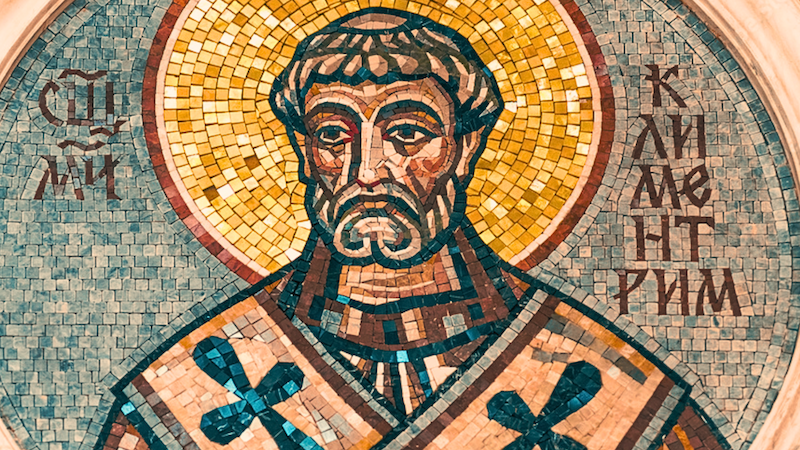
In Philippians 4, Paul celebrates the Philippians – commendable comrades, co-conspirators, and collaborators who he longs to be gathered with once again. These are people that Paul celebrates for standing in the Lord in a steadfast and established way with perseverance and unwavering commitment despite the uneasy times they are in. Writing from his imprisoned state at a distance, Paul realizes written words and interceding prayer are the only hopes that he has to give a kindled spark and prophetically promising word that will bring life back to his friends who have become fatigued and frayed along the way. Navigating the winding road of a missional faith in a storm-tossed world is no easy voyage — we are battered by oppressive headwinds, and worn by the weight of the hardships of the journey, and it has its effects are not ignored as we witness in Paul’s words gentle shepherding redirection to Euodia and Syntyche. Euodia and Syntyche were two women who served as leaders at Clement and Paul’s side and had now allowed the difficulty of their work and their differences to fracture their relationship together. Paul calls for them to rediscover their unity despite their differences and to remember their common destination as those who have their names written in the Book of Life.
Paul courageously declares that these Euodia and Syntyche contended (συναθλέω) with him and Clement. This Greek concept is one of shared mission and objective. There is no hierarchy but rather a cooperative effort. This word would have been used to describe athletic contexts, a significant part of their cultural life. Here, contended, communicates the same idea of “ride or die” partners, those individuals who fight alongside your side in a do-or-die, disciplined, unified, and collective effort. In the Old Testament, as the people worked together to rebuild the wall with Nehemiah they exemplified this idea of common striving. However, in Greek, such a word became even more powerful and resonated with a culture that understood what it meant to stand in defense together against the attacking powers for both the sake of survival and mission.
Just as Euodia and Syntyche allowed their differences to fracture their relationship, we see divisions today among followers of Jesus. I watch as friends on Facebook hurl insults and political talking points at each other from their entrenched positions. Political and cultural tensions have caused significant rifts, with people taking sides rather than striving together in a shared mission. Paul’s words still ring out today, calling for us to remember to contend together. Sadly, in today’s time, social media amplifies these divides, turning disagreements into public battles rather than opportunities for reconciliation. Even within local congregations, personal conflicts, personality differences, and theological disputes can create sinkholes and barriers to a unified missional contending together. Paul’s call to remember our common purpose is just as urgent today as it was in Philippi.
A Better Paradigm of Seeing Each Other
Euodia and Syntyche contended at the side of Clement and Paul, there was humility and honor, miracles and mission, but now their fractured state has sidelined their effectiveness. It is for the sake of greater unity, being an empowered witness, and mission effectiveness that Paul now calls for them to rediscover their unity – despite their differences and to remember their common destination as those who have their names written in the Book of Life. Though his journey with the Christian faith is quite complicated, Leo Tolstoy once said, “Christian love comes from the understanding that there is a unit of divine origins in oneself and in other people, and not only in people, but in all living things.” Tolstoy is saying that Christian love is a unifying act that emerges as we realize that there is something divine – the image of God – inside ourselves, and other people, and that God is what connects all of creation. This is the posture or paradigm we must accept about each other. In addition to seeing the image of God, from an evangelical perspective, unity is found through our common faith in Jesus Christ, who reconciles us to God and one another, making us one body through God’s love and forgiving grace. This is what Paul wants Euodia and Syntyche to grasp – who they are in Christ and how God has created them to be, reminding them of their role as image and cross bearers.
The call for unity between Euodia and Syntyche reminds us that we should be committed to overcoming our divisions—whether political or theological—and that this requires seeing one another through the lens of shared identity in Christ – as those written with their names in the Book of Life. Just as Paul urged them to focus on their common destination and purpose, we too are called to rediscover unity amid our differences, grounded in the love and reconciliation found in Jesus, so that our mission and witness may remain strong and effective. The people around us must be seen for the image of God they carry.
A Side Note: It’s Not About Women
It is interesting to note that I have seen this passage used to argue that women (seemingly prone to grudges in their opinion) should not be entrusted with leadership within the church. However, it is important to remember not only the many harmful grudges I’ve witnessed held by both women and men alike but also that the church in Philippi would not exist if it weren’t for the dedication of passionate and wise women who gathered and led prayer on the Sabbath—so much so that Paul expected to find a place of prayer there – but instead found women gathered there (Acts 16:13-14). I am not arguing that these ladies were pastors, but their notable leadership roles are self-evident. Lydia was just one of these women, and her hospitality as a believer in the Lord helped launch the church in Philippi (Acts 16:15). Within days, this community transformed into an authoritative and collective body of Jesus’ followers. A little while later, Paul and Silas were arrested, had an old-school revival meeting in prison, and upon their release they were then reunited at Lydia’s house, where they found the newly baptized brothers and sisters gathering together to be encouraged, implying that a church of sorts had already emerged (Acts 16:40). It seems that Euodia and Syntyche were among many gifted women in the church in Philippi who boldly declared God’s goodness and good news to those around them.
The Inspiration for Clement
This is the only time Clement is mentioned in the New Testament. Though, in this passage Clement is merely a name dropped in a story, simply named to be recognized as a credible witness to the ways, words, and works of Jesus—someone who traveled and contended alongside these women who have now derailed themselves from the fullness of what God wants and has for them. Clement is a Philippian follower of Jesus and an associate of Paul who knows the impact of these women and the Philippian church community. Clement is described “as having struggled side by side with him to preach the gospel,” and “To ‘struggle side by side’ is an image taken from the games and suggests that Clement was a ‘fellow athlete’ striving together with Paul in the united effort of preaching the gospel and sharing the suffering involved in that endeavor” (John Gillman, Clement, 1992, pg 1055). I believe that the division within the church in Philippi and its impact on their effectiveness left a lasting impression on Clement beyond this brief mention. Even more, I suspect that Paul’s charge stuck with him. Paul called for them to remember who they are in Christ and how God has created them to be, reminding them of their role as image and cross bearers, which seemingly was influential to Clement – perhaps even being an inspiration for him later on in the letter known as Clement 1.
According to Eusebius’ Ecclesiastical History, Clement wrote this letter (Clement 1) to the church in Corinth when there was trouble (a divisive treason according to Eusebius) brewing in the Corinthian church – much like what we saw in Philippi where Clement is mentioned. Early church leader Hegesippus also confirms that trouble was dividing the church. In Hegesippus’ remaining Memoirs, he mentions that Corinth was still correcting the errors. Eusebius mentions that the impact of Clement’s letter continued as the letter was still being read publicly in many churches, both in the past and in his day – the 300 ADs. Seemingly, one of the major reasons Clement’s letter was being read was because of how he looked to unify others.
Clement—sometimes called Clement of Rome—would go on to become an early church father, a bishop, and a regional overseer of the early church. Eusebesis, in his Ecclesiastical History, tells us Clement succeeded Anencletus after the latter had been bishop of the church of Rome for twelve years.” Dr. Nathan Feldmeth, who I was blessed to study under at Fuller Seminary, points out that Clement of Rome is “among the most prominent of the apostolic fathers” which also included “Ignatius, Papias, Polycarp and Barnabas.” However, I should note that Dr. Feldmeth and some others disagree that Clement of Rome is the same as mentioned in Philippians by Paul.
Side Note: Which Clement?
I argue that the Clement we see in Philippians is the Clement of Clement 1. Some certainly believe that equating them as one-in-the-same is an “exercise in the realm of conjecture,” but the historic church tradition (Origen of Alexandria and Eusebius of Caesarea) suggests they are the same and that is a good starting place for me. Additionally, based on the origin years of these letters it is very possible. Clement 1 also gives us insights into the last years of Paul’s life (implying proximity), he alludes to Philippians, and the intact message is similar to what is modeled by Paul. Plenty of scholars give room for this possibility including Craig S. Keener. Also, Philippi is a Roman colony that was built to be like a small or little Rome, and to make an adjustment to be a Bishop in the capital of the Roman empire would not be that difficult to believe. Slightly later, Irenaeus of Lyons (AD 130–200) provides evidence of Clement of Rome’s connection to the apostles, stating that Clement had personally seen and interacted with them. Irenaeus describes Clement as someone who still had the apostles’ preaching echoing in his ears and their traditions before his eyes (Against Heresies 3.3). This testimony supports the idea that our Clements are the same.
Clement’s Call for Unity
However, my point isn’t who Clement is – but the way he might have been inspired by calls for unity in the church in Philippi and mirrors that himself. Even further, In Clement 1, Clement of Rome goes on to suggest that such honor between people – rather than discord – cultivates a unique empowering of the Holy Spirit. Clement provides us with significant historical, theological, and ecclesiastical insights into the church (and a “lower hierarchy” church than many want to suggest), but he also mirrors what I believe he saw in Paul: a call to rediscover unity despite differences and to remember their shared destination as those whose names are written in the Book of Life. In his writings of Book 1, Clement teaches the early church, particularly the Corinthians, that love, honor, and unity strengthen their effectiveness and their empowerment by the Holy Spirit. For the sake of greater unity, a more empowered witness, and mission effectiveness, Clement, like Paul, urges them—and us—to live humbly, to keep learning, and to submit to one another in unity and honor.
Listen to Clement’s words from Clement 1:
“And you were all humble-minded, in no way being boastful, being submissive rather than forcing submission, giving more gladly than receiving, being satisfied with the provisions of Christ, and paying attention to his words you have carefully stored away in your innermost being, and his sufferings were before your eyes. Thus a deep and luxurious peace was given to all, and an insatiable desire for good deeds, and a full outpouring of the Holy Spirit was upon all of you.”
In a short paragraph, Clement of Rome suggests what it means to have your name written in the Book of Life and to live into the fullness of what the Spirit-filled church is to be. Clement commends the church in Corinth to continue being:
- humble minded.
- in no way boastful.
- submissive rather than forcing submission.
- giving more gladly than receiving.
- satisfied with the provisions of Christ
- attentive to Christ’s words
- stewards and storehouses of Christ’s words away in your innermost being
- reminded of his sufferings before your eyes.
If one lives into these eight ways of being the church together, we see that Clement of Rome promises significant fruit for posturing ourselves in this way:
- deep and luxurious peace was given to all
- insatiable desire for good deeds was given to all
- full outpouring of the Holy Spirit was upon you.
Clement roots the church in Corinth back to their blessings, and it is a state of being that I want for our local church. Clement tells the Corinthians about what is being poured out on them and how it is because of these eight ways of being that Clement sees at work in their lives. I hear a similar call to Paul’s command to be unified in the contending here in Clement’s work.
Peace, Good Deeds, and Spiritual Power: God’s Work, Not Ours
Clement describes the blessings of a contenting peace, a hungering desire for good deeds in their lives, and the outpouring of the Holy Spirit in powerful ways – but does not mention that it is certain aspects of “holiness” that will help us to achieve this peace, desire, and Spirit outpouring that we might expect. Though Clement would agree sin is sin, he does not imply that peace, good deeds, and spiritual power come from sin management. Rather, he calls us to continually position ourselves in eight specific ways when living out will be greater than sin management, they will be actions that become sin-avoidant, and as a result will get an empowered sense of living like many of us desire today and false TV preachers dangle before us like a carrot. Clement tells the church in Corinth that there is a way of posturing oneself that leads to a transformed way of living, an authoritative way of living, that is even more than just dealing with our sins.
Notice where the good things are coming from – they are actions in God’s favor, not our own. Take note, that you cannot find peace, the desire for good deeds (over sin), and the outpouring of your Holy Spirit by anything you do. Rather, they are outpourings from God, gifts of the inbreaking of God’s rule and reign, when we position ourselves correctly – in unity and humility.
Clement’s command reminds us of the virtues that define our faith. His call for unity, humility, and love speaks to the heart of the Christian community. The eight qualities he highlights—patience, gentleness, perseverance, prayer, gratitude, holiness, vigilance, and brotherly affection—form a roadmap for how we should live and interact with others. We live in a world where I have grown weary of followers of Jesus trying to submit others to their way of thinking rather than finding submission in their lives – and the more we do that the more we miss out on what God is doing. By embracing these traits, we not only honor God but also nurture a community that reflects God’s love. What might happen if we strive to live with these eight values at the forefront of our journey as followers of Christ? Maybe, just maybe, if we can posture ourselves this way as a church community, as followers of Jesus, we will be part of the redemptive work of Christ in the world again – experiencing deep and luxurious peace, an insatiable desire for good deeds, and a full outpouring of the Holy Spirit was upon you.
Closing Remarks
I’m always interested in a good conversation or a cup of coffee. Let’s connect! I love hearing others’ stories and sharing my own while finding ways to support others on their journey. Feel free to reach out to me via email —I’d love to hear from you. You can also connect with me through Facebook, Instagram, Bluesky, X, LinkedIn, Threads, and/or YouTube.
The NET Bible (New English Translation) is a translation of the Bible with 60,932 translators’ notes! It was completed by more than 25 scholars – experts in the original biblical languages – who worked directly from the best currently available Hebrew, Aramaic, and Greek texts. I invite you to learn more about it, discover their resources, read it online, download it for free, purchase it, and use their online bible study software (don’t forget their iPhone app).













